“That started right around the second week of March,” owner Kevin O’Sullivan said of the month Ohio Gov. Mike DeWine signed a public health order requiring citizens to stay at home except for essential activities and requiring businesses to close in order to stem the spread of the coronavirus. “March was probably the biggest month we’ve ever seen in terms of sales. It was up three times our normal volume for a month.
“It’s been at times overwhelming.”
That includes an estimated 70% in new customers to the store.
“In April, it’s dropped off a little bit,” O’Sullivan said, citing the stay-at-home order. “We are taking a lot of phone calls. I suspect there are people that are still interested in getting a firearm but they don’t want to be physically in the store.”
RELATED: Complete coronavirus coverage
While Joe Eaton of the Buckeye Firearms Association, a gun owners rights advocacy group, cited concerns over government restrictions and “concern for families as criminals are known to take advantage of chaotic environments,” O’Sullivan attributed the rise in interest in gun ownership to multiple factors.
“It’s a whole combination of things that we’re hearing,” O’Sullivan said. “There are folks that are concerned that maybe society is going to break down in some way, and they feel a need to protect themselves.”
Reports of residents hoarding every-day items such as toilet paper could also play a role.
“I think the hoarding kind of begets more hoarding right – it becomes this self-fulfilling prophecy,” O’Sullivan said. “People think, ‘If I can’t get toilet paper, I better run out and buy more toilet paper.’ And we’ve seen some of that same kind of reaction from people who are searching for ammunition. Now that it’s harder to get, they become more concerned and so they want to stock up.”
But gun control advocates say the surge in firearm sales makes communities less safe, because during the pandemic there is increased risk of suicide, domestic violence and unintentional shootings.
Advocates also argue that gun stores are not essential businesses and they are putting customers at infection risk by remaining open when they don’t need to be.
Last month, the FBI’s National Instant Criminal Background Check System recorded 114,086 background checks from Ohio, which was the second highest statewide tally since 1998.
The background-check system became operational in late 1998, meaning there are no earlier records. Not every background check leads to a gun purchase, but many if not most do.
In more than two decades, only December 2015 had a higher number of background checks originating out of Ohio, 119,900. That followed a terrorist attack in Paris and a deadly mass shooting in San Bernardino, California, which led to increased calls for new gun-control measures.
Background checks in the state last month were 61% higher than in March 2019.
March’s total far exceeded the total in December 2012, after the Sandy Hook school shooting, when there were intense calls for new gun control measures.
MORE CORONAVIRUS IMPACT: Urbana University to close
Historic increases in gun sales across the nation are happening at a time when many Americans are confined to their homes and there is increased risk of unintentional shootings, domestic-violence shootings and suicide by firearm, John Feinblatt, president of Everytown for Gun Safety said earlier this month.
Everytown, which supports “common sense” gun laws, says the surge in background checks could mean that law enforcement is being overwhelmed and will not have adequate time to complete each background check.
The group says that could result in firearms being transferred to some people who later on are found to be prohibited from obtaining the weapons.
Most background checks are completed within minutes, but about 10% take longer than three business days, and when that happens, federally licensed gun sellers can choose to transfer the guns to the customer, Everytown said.
In 2018, more than 270,000 background checks were not completed within three business days, resulting in more than 4,800 gun transfers to people whose background checks later revealed they were prohibited from owning firearms, according to an April 2 letter to the ATF signed by 16 Democratic U.S. senators, including Sen. Sherrod Brown.
The letter asks the ATF to urge gun sellers not to transfer guns until background checks are complete, considering the increased demand on the background check system.
O’Sullivan said the background check system has gone down at times but generally functioned well for them even with the heavier volume lately.
“Probably one or two times in the middle of March when it was really, really heavy, the system went down, but generally it’s gone through pretty well,” he said. “I actually am fairly impressed with the performance of the FBI and the ATF in terms of dealing with the avalanche of background checks.”
He did express some concern about the increase in first-time gun buyers, particularly at a time when gun safety classes may be unavailable.
“Typically we would spend 45 minutes – at least – with them when they purchased a gun to go over some basic safety, some basic things about the firearm,” O’Sullivan said. “We don’t have to do that with our regular customers because they all know firearms, but because of almost an avalanche of customers, we haven’t had as much time as we typically would be to be able to spend with each new gun buyer. So my only hope is that they have friends, family, someone who they can go to to get some basic information about their firearms. Or maybe they could even bring the gun back to the store when things are a little quieter and we can go through some of that basic safety with them.”
About the Author

